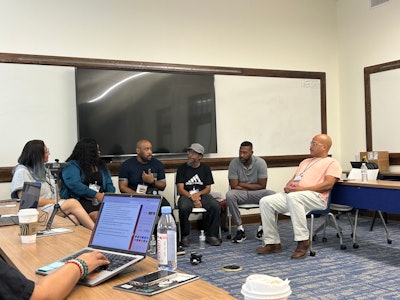As the nation celebrates five decades of hip-hop, scholars and activists gathered on Friday at Howard University to consider the relationship between academia and the musical genre. The gathering was part of a two-day convening that explored the significance of the music and its connection to activism.
"Hip Hop teaches us so many things before we are in a classroom," said Mikal Lee, a musician, and member of the Brooklyn Academy of Music. "How to dress, how to walk, how to talk, what not to do, what to eat, things like that."
He said that his introduction to political science came in the form of a Public Enemy album. Panelists at the hip-hop conference at Howard University.
Panelists at the hip-hop conference at Howard University.
"I learned more in my background and my degrees in literature and poetry from listening to Freestyle Fellowship and Nas," he said.
Lee said that hip-hop has enriched his life through the lessons he learned by listening to albums as a youngster. Still, he and many other music enthusiasts feel they need to continue advocating for academic institutions to take the art form more seriously. Over the past decade, a chorus of academicians have called on colleges and universities to do a better job of integrating hip-hop into their curriculum.
Rev. Moya Harris, a Ph.D. student studying African American preaching and hip-hop at Christian Theological Seminary, said that there is an idea that hip-hop is not respectable enough to be in academe, adding that a vast array of knowledge can be accessed if people are open to it.
Dr. David Green, an associate professor of English at Howard University was part of the push to create hip-hop studies as a minor at the historically Black university, adding that the process to get buy-in from administrators was not easy.




















